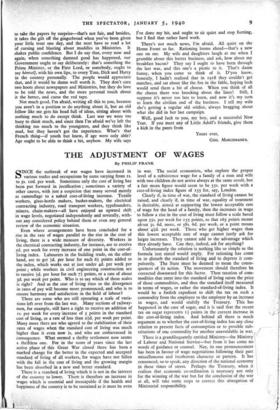THE ADJUSTMENT OF WAGES
By PHILIP FRANK SINCE the outbreak of war wages have increased in various trades and occupations by sums varying from is. to 5s. 1od. per week. Sometimes only the cost of living has been put forward in justification ; sometimes a variety of other causes, with just a suspicion that many served merely as camouflage to a naked cost-of-living increase. Textile workers, glass-bottle makers, basket-makers, the electrical contracting industry, road transport workers, typefounders, miners, chain-makers—all have enjoyed an upward shift in wage levels, negotiated independently and severally, with- out any considered policy behind them or even any general review of the economic situation.
Even where arrangements have been concluded for a rise in the rate of wages parallel to the rise in the cost of living, there is a wide measure of diversity. Workers in the electrical contracting industry, for instance, are to receive 5d. per week for every increase of one point in the cost-of- living index. Labourers in the building trade, on the other hand, are to get Id. per hour for each 62 points added to the index, which works out at just under 4d. per week per point ; while workers in civil engineering construction are to receive 1-d. per hour for each 71 points, or a rate of about 3d. per week per point. Who is to say which of these scales is right? And as the cost of living rises so the divergence in rates of pay will become more pronounced, and who is to ensure harmony and satisfaction in the field of labour?
There are some who are still operating a scale of varia- tions left over from the last war. Many sections of railway- men, for example, still have a right to receive an addition of is. per week for every increase of 5 points in the standard cost of living, or a rate of less than 2i-d. per week per point. Many more there are who agreed to the stabilisation of their rates of wages when the standard cost of living was much higher than it even now is, and who are embarrassed in consequence. What seemed a thrifty settlement now seems a thriftless one. For in the score of years since the last active phase of this Great War closed there has been a marked change for the better in the expected and accepted standard of living of all workers, for wages have not fallen with the fall in the cost of living and the growing margin has been absorbed in a new and better standard.
There is a standard of living which it is not in the interest of the country to lower. There is therefore an increase in wages which is essential and inescapable if the health and happiness of the country is to be sustained as it must be even in war. The social economists, who explore the proper level of a subsistence wage for a family of a man and wife with two children do not arrive always at the same result, but a fair mean figure would seem to be 55s. per week with a cost-of-living index figure of 155 for, say, London.
Clearly if, in time of war, the standard of living cannot be raised, and clearly if, in time of war, equality of treatment is desirable, aimed at supporting the lowest acceptable rate of wage for the head of a family, then the increases in wage to follow a rise in the cost of living must follow a scale based upon 55s. per week for 155 points, so that 165 points means about 3s. 6d. more, or 58s. 6d. per week, or a point means about 41-d. per week. Those who get higher wages than this lowest acceptable rate of wage cannot justly ask for larger increases. They cannot add to the advantage which they already have. Can they, indeed, ask for anything?
Unfortunately the solution is nothing like so simple as the formula just stated would imply. For rationing has come in to disturb the standard of living and to depress it com- pulsorily. The State must be deemed to mean the conse- quences of its action. The movement should therefore be corrected downward for this factor. Then taxation of com- modities that enter into the standard of living raises the price of those commodities, and thus the standard itself measured in terms of wages, or rather the standard-of-living index. It would be a foolish expedient to shift the tax on such a commodity from the employee to the employer by an increase in wages, and would stultify the Treasury. This has happened in the case of sugar, and it is said that the recent tax on sugar represents points in the current increase in the cost-of-living index. And behind all there is much argument as to whether the cost-of-living index has any close relation to present facts of consumption or to possible sub- stitutions of one commodity for another unavoidable in war. There is a grandiloquently entitled Ministry—the Ministry \ of Labour and National Service—but from it has come no words of guidance or counsel. Nay, its one pronouncement has been in favour of wage negotiations following their past miscellaneous and incoherent character or pattern. It has renounced, so to speak, any direction of the national economy in these times of stress. Perhaps the Treasury, when it realises that economic co-ordination is necessary not only for the winning of the war but for the conclusion of the war at all, will take some steps to correct this abnegation of Ministerial responsibility.


































 Previous page
Previous page